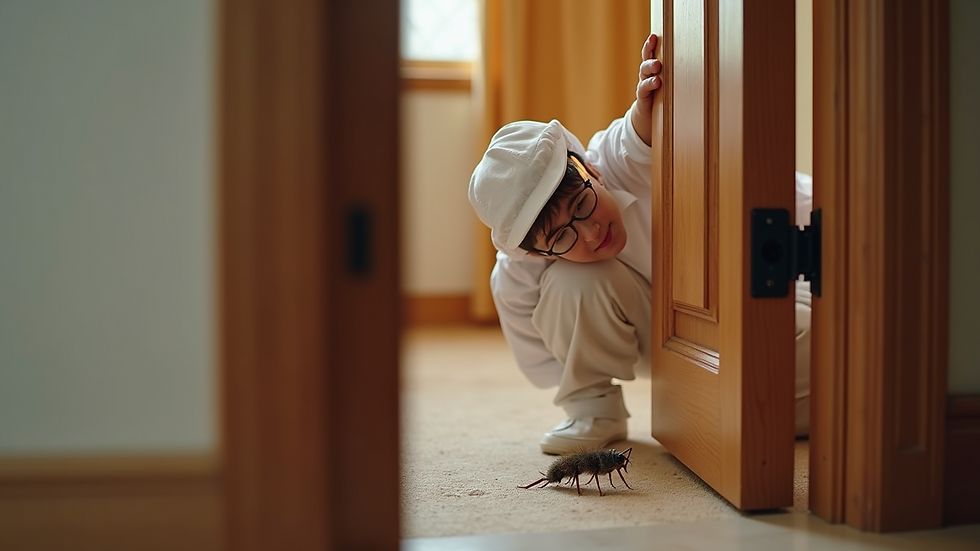Comprehensive Pest Control Inspections Explained
- jamesferrari47
- Sep 15
- 4 min read
When it comes to protecting your property, a detailed pest evaluation is the first and most important step. Whether you own a home or run a business in Florida, pests can cause serious damage and health risks. I want to walk you through what a thorough pest control inspection involves, why it matters, and how it helps keep your space safe and pest-free.

What Is a Detailed Pest Evaluation?
A detailed pest evaluation is a careful and systematic check of your property to identify any signs of pest activity. This inspection covers every nook and cranny where pests might hide or enter. It’s not just a quick look around; it’s a deep dive into your property’s vulnerabilities.
During this evaluation, a trained professional examines:
Structural damage caused by pests like termites or carpenter ants
Signs of rodents such as droppings or gnaw marks
Evidence of cockroaches, ants, spiders, and other common pests
Moisture problems that attract pests
Entry points like cracks, gaps, and holes
The goal is to find existing infestations and potential risks before they become bigger problems. This helps you take action early and avoid costly repairs or health issues.
Why a Detailed Pest Evaluation Is Essential
You might wonder why you need a detailed pest evaluation if you don’t see any pests. The truth is, many pests stay hidden until they cause noticeable damage. A professional inspection uncovers these hidden threats.
Here’s why it’s essential:
Early Detection: Catch infestations before they spread.
Prevent Damage: Protect your property’s structure and belongings.
Health Protection: Avoid diseases carried by pests.
Peace of Mind: Know your property is safe and secure.
Tailored Solutions: Get customized treatment plans based on findings.
For example, termites can silently destroy wooden structures. Without a detailed inspection, you might not notice until the damage is severe. A thorough evaluation spots termite activity early, saving you thousands in repairs.
What Happens During a Pest Control Inspection?
When you schedule a pest control inspection, a professional arrives ready to assess your property inside and out. Here’s what typically happens:
Initial Walkthrough: The inspector surveys the exterior and interior.
Detailed Examination: They check walls, ceilings, floors, attics, basements, and crawl spaces.
Moisture Check: Moist areas attract pests, so these get special attention.
Entry Point Identification: Cracks, vents, and gaps are inspected.
Evidence Collection: Signs like droppings, nests, or damage are documented.
Report and Recommendations: You receive a detailed report with findings and next steps.
This process usually takes 30 minutes to an hour, depending on property size. The inspector uses tools like moisture meters, flashlights, and sometimes even infrared cameras to detect hidden pests.

How to Prepare for Your Detailed Pest Evaluation
Preparing your property for a detailed pest evaluation helps the inspector do a better job. Here are some simple steps you can take:
Clear Clutter: Remove boxes, furniture, and debris from inspection areas.
Provide Access: Unlock gates, doors, and cabinets.
Fix Leaks: Repair dripping faucets or pipes to reduce moisture.
Note Pest Sightings: Write down where and when you’ve seen pests.
Inform the Inspector: Share any previous pest treatments or concerns.
These actions make the inspection smoother and more effective. The more information you provide, the better the inspector can tailor their evaluation.
What to Expect After the Inspection
Once the detailed pest evaluation is complete, you’ll get a clear picture of your property’s pest status. The inspector will explain:
What pests were found or suspected
Areas at risk for future infestations
Recommended treatment options
Preventive measures to keep pests away
You might receive a written report or a digital summary. This report is your roadmap to pest control success. It helps you decide on treatments and maintenance plans.
If pests are detected, don’t delay treatment. Early action is key to stopping infestations from growing. If no pests are found, regular inspections still help maintain a pest-free environment.

Why Choose Eco-Friendly and Guaranteed Pest Control Services
Choosing the right pest control company matters. I recommend services that focus on safe, eco-friendly solutions. These methods protect your family, pets, and the environment while effectively managing pests.
Look for companies that offer:
Guaranteed Results: They stand behind their work with warranties.
Safe Products: Use low-toxicity or natural treatments.
Experienced Technicians: Skilled in detailed pest evaluations and treatments.
Customer Support: Clear communication and follow-up services.
This approach aligns with long-term pest management goals. It reduces chemical exposure and builds trust between you and your pest control provider.
Keep Your Property Pest-Free Year-Round
A detailed pest evaluation is not a one-time event. Regular inspections and maintenance keep pests at bay. Here are some tips to maintain a pest-free property:
Schedule annual or bi-annual inspections.
Seal cracks and gaps promptly.
Keep your property clean and dry.
Store food in sealed containers.
Trim vegetation away from buildings.
By staying proactive, you protect your investment and health. Remember, prevention is always better than cure.
A detailed pest evaluation is your best defense against costly and dangerous pest problems. It uncovers hidden threats, guides effective treatments, and helps maintain a safe environment. Don’t wait for pests to take over. Schedule your pest control inspection today and take control of your property’s health.



Comments